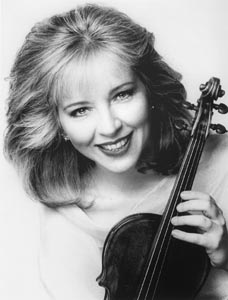![[MetroActive Music]](/gifs/music468.gif)
[ Music Index | Santa Cruz | MetroActive Central | Archives ]
Rite On
Symphony sacrifices mystery for bombast in a packed-house performance of 'The Rite of Spring'
By Scott MacClelland
YET ANOTHER EXPERIMENT in acoustics at Santa Cruz Civic Auditorium greeted the Santa Cruz County Symphony audience March 26. Due to the oversized orchestra required for Stravinsky's Le Sacre du Printemps, the entire program was played on the flat floor, not on the familiar risers. That included the slender forces required for Vivaldi's Four Seasons, whose soloist, violinist Stephanie Chase, conducted from the bow.
Actually, the only hint of acoustic experimentation came in remarks from people connected with the Symphony, asides which didn't seem very serious. Instead, the great Stravinsky score gets credit for brashness, and, from the unusually large size of the audience, seemed to be the program's principal draw. Conductor John Larry Granger had his hands full with the frequent meter changes, bursting entrances, mercurial tempo shifts and sharp dynamic contrasts. That he was able to shape an interpretation at all was an accomplishment.
But, in fact, Stravinsky's instructions were designed to minimize "interpretation." He just wanted the conductor to get it right according to his notational exactitude. In the long history of the work, as documented through numerous recordings, the composer's own interpretation seems straightforward and relatively tame. Leonard Bernstein, on the other hand, exaggerated dynamics and tempi in favor of a raw sound and seismic effects. (There exists a video documentary of Bernstein, near the end of his life, teaching a youth orchestra how to generate this primal energy in the piece.)
Granger's orchestra came up with a hybrid, muscling up for the big brass and percussion outbursts, developing some powerfully propulsive passages, but going soft in string sonorities. Especially in the opening pages, Granger's driving tempi disallowed a mood of superstition and the rise of fear at things that go bump in the pagan night.
On the one hand, there were ultimately too few strings to balance the enormous wind and brass choirs. On the other, Granger's early pacing sailed through some of the work's most gripping effects, those that should move one's heart into one's throat, or at least one's backside to the edge of the seat.
With increasing confidence, the piece got stronger as it unfolded, and, in the closing moments, achieved a momentum that almost spun it out of control, an urgency of excitement that Granger could do well to risk more often. The musicians had a great time of it, certainly for their myriad solos but not less for their vivacious ensembles. (After himself, Stravinsky loved nothing better than the instruments he composed for.) And Granger took home one of his field's most coveted prizes, an ultimately successful performance of The Rite of Spring, the supreme icon of 20th century symphonic music.
Veteran artist and rock-solid musician Stephanie Chase delivered excellent virtuosity and self-possessed personality to her survey of the four popular Vivaldi concertos. She defined her own ideas by giving fresh life to these overexposed works, but cared not a fig for the vain examples of others, be they prissy scholars or big egos a-tripping. Her small orchestral string ensemble responded with all the right programmatic effects--barking dogs, buzzing gnats, distant thunder, violent squalls, icy shivers. Only harpsichordist Linda Burman-Hall got short shrift from the room's lack of sufficient acoustic support. (Her lute stop, actually, made the bigger impression.)
The Symphony board used the occasion to announce subscription tickets to its 2000-2001 season, Granger's 10th with this organization. Soloists include pianist Diane Hidy, guitarist David Tanenbaum, pianist Stephen Prutsman, violinist Sheryl Staples and the winner of June's Irving Klein String Competition. Except for the world premiere of Prutsman's own piano concerto and Harry Brant's "Whoopee," familiar repertoire will fill the season.
[ Santa Cruz | MetroActive Central | Archives ]
Copyright © Metro Publishing Inc. Maintained by Boulevards New Media.
![]()
 Shot Over the Bow: Violin soloist Stephanie Chase led a slim orchestra for Vivaldi's 'Four Seasons' in a fresh take on the baroque classic.
Shot Over the Bow: Violin soloist Stephanie Chase led a slim orchestra for Vivaldi's 'Four Seasons' in a fresh take on the baroque classic.
From the March 29-April 5, 2000 issue of Metro Santa Cruz.